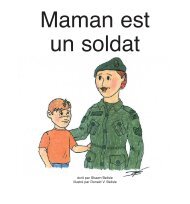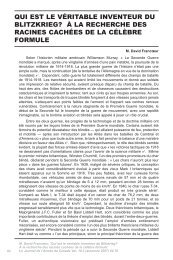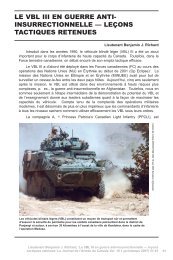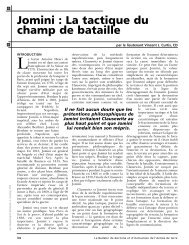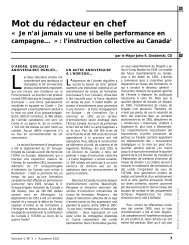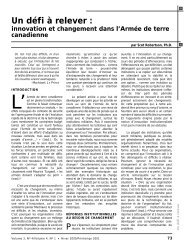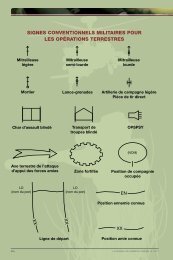The Canadian Army Journal
The Canadian Army Journal
The Canadian Army Journal
You also want an ePaper? Increase the reach of your titles
YUMPU automatically turns print PDFs into web optimized ePapers that Google loves.
10<br />
French forces during the general insurrection of 1845-46. France’s counter-insurgency<br />
operations in Algeria in the 19 th century illustrate military challenges that seem timeless<br />
if one is not mesmerized by technological issues and understands that ideology can take<br />
many forms. <strong>The</strong> later cases of French military involvement in counter-insurgency in<br />
Indochina and Algeria are also useful, for they show not only that the same themes<br />
reappear a century later, but also how the split between the tactical/operational and<br />
strategic realms became the chink in the armour that was exploited by the enemy<br />
through the use of ambushes and IEDs.<br />
Algeria in the 19 th Century (1839-1857)<br />
General Description<br />
France invaded Algeria in 1830, attacking and seizing its capital Algiers. Although<br />
many reasons were stated for embarking on this military operation, it was undertaken<br />
essentially for reasons of prestige. 5 After losing many of its colonies in the 1700s and<br />
the defeat of Napoleon, France sought to recover its former status as major global<br />
power. <strong>The</strong> actual conquest of Algeria was accomplished in stages, starting from the<br />
Mediterranean Sea and moving towards the south. However, France did not become<br />
involved in substantial counter-insurgency operations until 1839, by which time it had to<br />
govern large portions of Algeria’s inland territory. By 1842, the French military<br />
commitment had reached 100,000 troops, 6 a major endeavour for a country that then<br />
had approximately 30 million citizens and was still surrounded by unfriendly neighbours.<br />
By 1839, the resistance to the French forces had coalesced around the charismatic<br />
figure of Emir Abd-el-Kader (not unlike Osama bin Laden). He was pursued for years in<br />
a game of cat and mouse, and only being captured in 1851. Abd-el-Kader was able to<br />
stage his insurgency from Morocco, which, like present-day Pakistan, had an ambiguous<br />
attitude towards the insurgents. Like Iraq, Algeria is a multi-ethnic country and even the<br />
capture of Abd-el-Kader did not stop the insurgency, merely displacing its centre from the<br />
Arab populations to the Kabyles who live mostly in mountainous areas. It was not until<br />
1857 that the country (with the exception of the Great Desert in the south) was pacified,<br />
27 years after the fall of Algiers. As in present-day Afghanistan and Iraq, the insurgents<br />
were fighting foreign troops whom they considered to be both invaders and religious<br />
infidels.<br />
<strong>Canadian</strong> <strong>Army</strong> <strong>Journal</strong> Vol. 11.1 Spring 2008<br />
Combat camera AR2006-A01-440


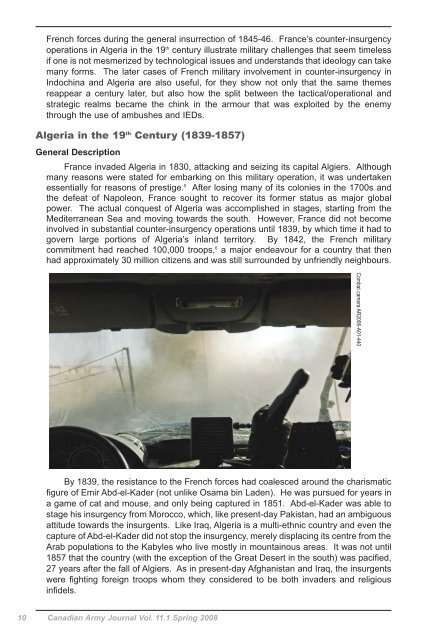
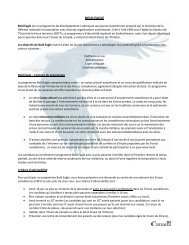

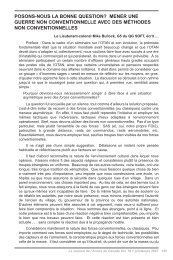

![La modularite dans l'Armee de terre canadienne [pdf 1.6 MB]](https://img.yumpu.com/17197737/1/188x260/la-modularite-dans-larmee-de-terre-canadienne-pdf-16-mb.jpg?quality=85)

